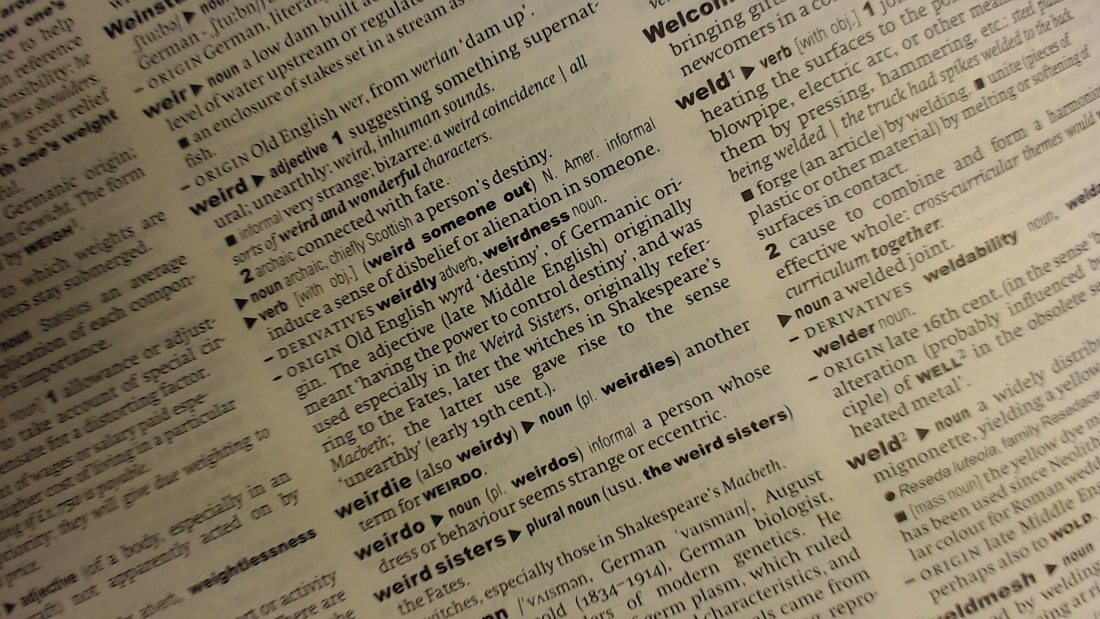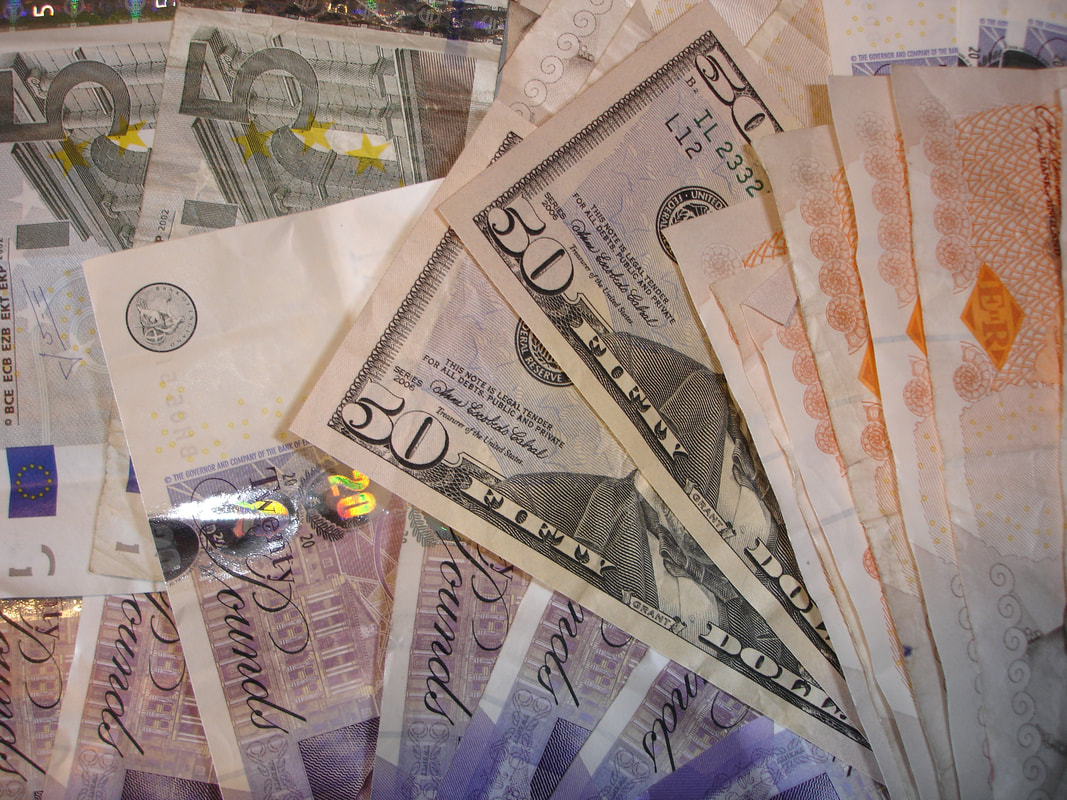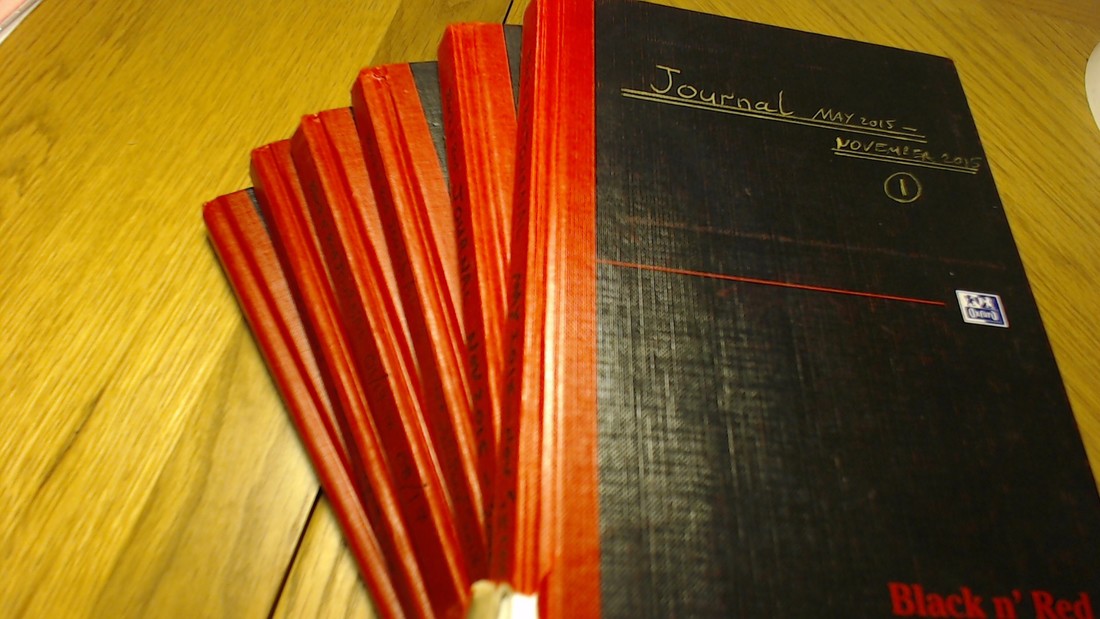|
You’re So Weird!
The Thursday Thesis - 26/04/18 Nina was not a happy camper – not by a long stretch. The plan I’d persuaded her to test was working beautifully, and people were noticing... Nina had been very down and depressed for a few years, so I invited her to experiment with being positive, optimistic, and unconditionally happy - just for a change. The test was supposed to last for a few weeks – just to see if she liked being deliberately happy better than being depressed. Now, it wasn’t that Nina had a problem with depression – she was very good at it, as a matter of fact – but it wasn’t making her happy or fulfilled. No surprise there, then. Anyway, she agreed to play my “stupid mind-game” and, six weeks into the programme, she was having a lot more fun, laughing more and thoroughly getting under the skin of her downbeat, unhappy co-workers. In fact, she’d been so happy that the misery-guts crew were convinced she’d either fallen in love or found God. Either way, it wasn’t going down well with the glumsters that she’d dare to flounce into work and actually enjoy her day. Such effrontery! They asked her to stop being so damned happy, because she was getting them down! They asked what was wrong with her. They said it wasn’t normal for someone to be that happy! Then it happened – someone called her “weird”. Now, Nina’s a shy sort of woman who likes to keep a low profile, so the W bomb rattled her mightily. All I could do was grin at her story. “You are weird” I said, “That’s what I like about you”. She threw me one of those looks that somehow manage to convey disbelief, fury and bewilderment all at the same time. “How can it ever be good to be weird?” She asked. “Because weird is such a fabulous word, and such a fabulous thing to be”, I said. I pulled down my Oxford Dictionary of English and flapped around a bit until I found the definition of weird. Here’s what it said: “WEIRD: adj. 1, Suggesting something supernatural, unearthly. Informal: very strange, bizarre. 2, archaic, chiefly Scottish: a person’s destiny. ORIGIN: Old English wyrd “destiny” of Germanic origin. The adjective (late Middle English) originally meant “having the power to control destiny”, and was used especially in the Weird Sisters, originally referring to The Fates...” Nina considered that definition for a moment, and I could see the understanding turning the corners of her mouth upwards. She “got it” - why I believe that the nicest thing anyone has ever said to me is “You are so weird!” It even beats that precious and tender moment when my then-girlfriend said I was the oddest person she’d ever met. I understand that many people would be insulted if they were called weird – but I revel in it. Why would I choose to be pleased to be weird? Because the word itself denotes other-worldliness, the supernatural and the mysterious: what’s not to like about that? I also love the connotation of being able to control my own destiny. As for Nina, she’s happy to be weird, and her colleagues still think she’s weird to be happy. Which side of the fence are you on, and how wonderfully weird are you going to be today? I’m off to dree my own weird and be annoyingly chirpy. Happy Thursday, you weirdo!
1 Comment
he Thursday Thesis - 19/04/2018 Why Being Filthy Rich might be a Bad Thing We’d all like to be “filthy rich”, wouldn’t we? It stands to reason that to be rolling in readies would be a good thing, doesn’t it? I’m sure we’d all benefit from having a few million more in the bank. So why aren’t we? Could it be tied up with how we talk and think about money? There’s a lot of research out there that suggests there’s no shortage of money, so where is it? It’s in the hands of those rich bastards – the Filthy Rich, of course! But what if you suddenly became Filthy Rich – how could it ever be a bad thing? Let’s take the phrase apart, starting with Filthy. Do you want to be filthy? Notice how that word sounds when you isolate it, sort of dirty, grimy and unpleasant? Now let’s look at the other part of the phrase: Rich. First of all, Rich is a comparative word used to contrast abundance with lack. And, of course, Rich is also a political term, often used by those who don’t have money to attack those who do, usually with the intention of “redistributing” (a euphemism for stealing) some of that money. Forced redistribution (theft under menace – or mugging, as it is known in street terms) is immoral and counterproductive because it removes the incentive to produce or excel whilst simultaneously reinforcing the “right” to a free ride. Fair tax is one thing – and remember that you have a legal duty to pay only the minimum amount of tax due in law – but penalising the successful because they’ve worked, invested, saved in order to improve their lot under their own steam? That’s truly immoral. But here’s the thing – “rich” people get rich by providing “poor” people (also known as customers) with a product or service that the customers value more than they value their money. So a fair exchange is struck, and the money passes from one person to another. No duress, no coercion: it’s an exchange of perceived value, that’s all. It’s not political. But, depending on the political climate in which your ideas were formed, it is possible that your idea of wealth has been distorted and loaded with negative images of money and of the people who have money – for example, the Filthy Rich, the Stinking Rich, Dirty Money, Filthy Lucre... you know the type of thing, don’t you? Now if your images and descriptions of people with money are semantically loaded with negatives, then you won’t want to be that kind of person. In fact you’ll probably aim to be the opposite of that kind of person, and since the opposite of Rich is Poor, you may well be unconsciously aiming to be poor. If your attitudes and beliefs carry the idea that there’s something wrong, filthy or immoral about being wealthy, you will likely remain poor. Furthermore, if you ever get to your mental threshold of acceptable wealth, you’ll find a way to get rid of the uncomfortably large sum of money that feels wrong for you to have. That’s why so many lottery winners are skint again in next to no time after their big wins. Having money simply makes you more of who you are, for better or worse. If you are a fool when you have a little money, you’ll probably still be a fool when you have lots of money – but the effects of your foolishness will be amplified by the leverage of your new-found (and probably fleeting) wealth. Similarly, if you are a caring and generous person when you have a little money, your capacity to care and be generous will be amplified by the leverage of wealth. The money itself is neutral – it doesn’t care: money is neither good nor bad. As a kid I was told that rich people were greedy and selfish, and I believed it. Who actually said that sort of thing? People who had no money, of course! But I’ve met many very wealthy and successful people over the years, and I’ve completely changed my mind, because the richer and more successful people are, the more positive, generous and caring they are. They became wealthy and successful because of those traits, and the money amplified what was already there. Perhaps today would be a good day to examine your beliefs about wealth, the way you think about money and the people who have a lot more money than you. What do you reckon? © Neil Cowmeadow 2018
Please Like and Share The Thursday Thesis with your friends, family, your llama, unicorn and anyone else. I’d love to hear your comments, along with any ideas you’d care to hurl at me. Neil@cowtownguitars.net “By the end of Today...”
The Thursday Thesis - 12/4/2018 I am writing this post to one person in particular - a friend – to remind them of a conversation we had about staying positive and becoming buoyant whilst navigating the seas of negativity. It all began with a little book. One little book and a single word. The word was – and still is - “Today”. My little book and that one word have made a big difference in my life: perhaps you will try them too. It is widely known that goals and ambitions are vital to achievement and happiness, and I’ve written about goals before on the blog, though I’ve mostly discussed long-term goals. So, what about short-term goals? I have set daily goals for business and work for decades, and I recommend them for anyone. The problem with business and work goals was that I didn’t set any personal daily goals or remind myself of some important parts of my life. Dumb. I’d blundered along doing work-stuff with a sense of purpose and a timeline to get things done, but other things fell apart from neglect and error that I should have known better than to fall into. Dumb. But a few years ago I was listening to Peter Thomson - a very charismatic speaker and trainer - describing what he did every morning, before he did anything else at all. I adopted the practise the very same day, reasoning that a few minutes in the morning and a couple more, last thing at night, couldn’t do any harm and might just do a little good. They are the most important minutes of the day. Every day – whilst the coffee machine warms up - I open my little book and write my daily journal entry. I don’t write much, just four things I want to be true by the end of the day, and a list of what I have to be grateful for, and what I want to have, in order to be grateful for that, too. I pick up my very best fountain pen and begin with the date and these words: “By the end of Today, I will it to be true that...” I then list three or four things that I must have in my life, like this: “By the end of Today, I will it to be true that:
My list is almost always the same these days, but it has evolved over the years. The second half of the morning journal is the list of what you have to be grateful for, or want to have and be grateful for. So my journal reads like this “Today I am grateful for life, Alex (my son), health, home, food, friends, love, honesty, courage, helping people, confidence, wealth, ambition, drive, patience, clarity, energy, strength, grit, laughter, optimism, choices, wisdom; my big heart and healing gifts” I’m particularly proud of the Big Heart thing, because it was my great friend Krish’s description of me, whilst Jason - a Shaman and friend – described my teaching skills as “Healing Gifts”. Now I’ll confess to feeling like a fraud when I started journaling, and I almost quit after a few days because I didn’t feel any different. But I stuck with it, and I’m so glad that I did. After several weeks it started to feel natural to write positive things about myself every day, and to remind myself of what I would do in the day ahead to be a better man and to hold myself to account. Unsurprisingly, the days began to pass with more vitality, self-care, and fun. That’s what Peter shared, and it’s what I do every day, and what I want you to do - from today onwards – for the rest of your life. And now we come to the end of the day journal: it takes around two minutes – so don’t skip it. Before sleep, just reflect on the day, and write:
Then add the good stuff from your day, perhaps something like this:
DO this every day, and you will inevitably begin to feel curiously uplifted as you recognise and record the many positive facets your life already has, and begin to attract more good things to you. Constantly reminding yourself of what you want, value and are grateful for is crucial to success and happiness. This daily routine primes your Reticular Activating System* to seek out what you want more of and what is important to you. This is the difference between taking aim at a target and randomly firing in all directions! Start your own journal today, and see where it takes you. Keep it positive and believe in yourself. To you, my friend, I say this: you are enough, and you are not broken. *see the previous blog post 08/03/2018, The RAS. © Neil Cowmeadow 2018 Please Like and Share The Thursday Thesis with your friends, family, your pet squirrel, monkfish, unicorn and anyone else. I’d love to hear your comments, along with any ideas you’d care to hurl at me. Neil@cowtownguitars.net The Thursday Thesis 5/4/2018 My friend Simon mentioned them in passing, and his words caught my ear. “...and that’s The Spirit Bead” he said “Oooh!” I responded – “I love that...The Spirit Bead...yes, very good. Beautiful.” Leaping from the Middle East to the Prairies of North America with a single bound, Simon linked the parallel practices of Moslem rugmakers in Persia to the Nations of the Dakota Sioux, Blackfoot, and many more tribes of North America. We had been talking about perfectionism’s long shadow, during an interview for my upcoming podcast, and Simon explained to me how traditional Persian rug-makers always include a tiny flaw in every rug: these deliberate errors are called “Persian Flaws”. Their belief is that only Allah can create perfection, and that to create a flawless rug or carpet is an offence against Him. Fascinating. Native American jewellery makers also included deliberate errors in their works, in honour of the Spirit World, and as an acceptance that man is imperfect. You can still see the practice today, in the Heishii beadwork made by the Navajo and Kewa Pueblo people. In both Moslem and Native American traditions, everything is made with an error included in it. Since only Allah and the Great Spirit can create perfection, the deliberate inclusion of an error reminds us that everyone is imperfect and flawed in some way. Call it a Spirit Bead or a Persian Flaw, the eye is drawn to the flaw. Whilst the great majority of the rug, or necklace is perfect - but there’s just that one little thing that bugs us and fascinates us... What’s your Persian Flaw, your Spirit Bead? Who cares what we call it – it’s our Spirit Bead that we are best known for, isn’t it? We most often remember the flawed and imperfect people because they are unusual, unexpected and strange enough to capture attention. As a guitarist, I am drawn to the imperfections present in older recordings – before digital editing made it possible to edit such things out. That’s where the “soul” is in music. In the tiny hesitations and rushes that move the player outside of perfect timing there is the musical magic of what we call “swing”. I truly believe that the dullness of playing dead on the beat is the origin of the modern slang “deadbeat”. Spare me the pristine perfection of some modern music, please. I remember when the Pure Trance music producer, Rich Mowatt - aka Solarstone - asked me to include additional pick and string noise in a guitar overdub/solo. There’s a man who “gets it”! My ears listen for the sonic Spirit Beads... And, as I said, we seek out the Spirit Bead in the people we meet. I’m not perfect, not by a long road, and I count my blessings that I am not. Perfect would be so dull! Perfect means that there’ no room to improve, no cracks to fix and no leaks to plug. Perfect means that we are irredeemably “done”. Nothing left to learn or do: I’m done. Can you imagine how depressing that would be? How dull it would be to know everything, to be perfect at everything? Where’s the growth? Where’s the failure to rise up again from? Where’s the falling-down and the bloody knee? If there’s one thing I’ve learned over the years it’s this: enjoy being yourself and enjoy your imperfections, because if you were to subtract your imperfections there’d be sod-all left except for the amorphous grey eternity of perfection. Yuk. I’m thoroughly imperfect, and – damn it all – I’m proud of it. So, to give The Finger to a world which worships perfection, I’d like to propose a toast to imperfection. Here’s to being gloriously glitch, fabulously flawed and delightfully defective; here’s to our Spirit Beads, our Persian Flaws, because they are all that stand between us and the eternal sterility of perfection. Now go and be Gloriously Imperfect: go and show off your Spirit Bead. © Neil Cowmeadow 2018
Please Like and Share The Thursday Thesis with your friends, family, your cat, unicorn and anyone else. I’d love to hear your comments, along with any ideas you’d care to hurl at me. Neil@cowtownguitars.net |
Share it with your friends
It's Like This...The Thursday Thesis shares ideas which I think are worth spreading. Archives
May 2022
Categories
All
All content on these pages is the intellectual property of the author, unless otherwise stated, and may not be used in any form or reproduced under any circumstances without the authors permission.
|




 RSS Feed
RSS Feed